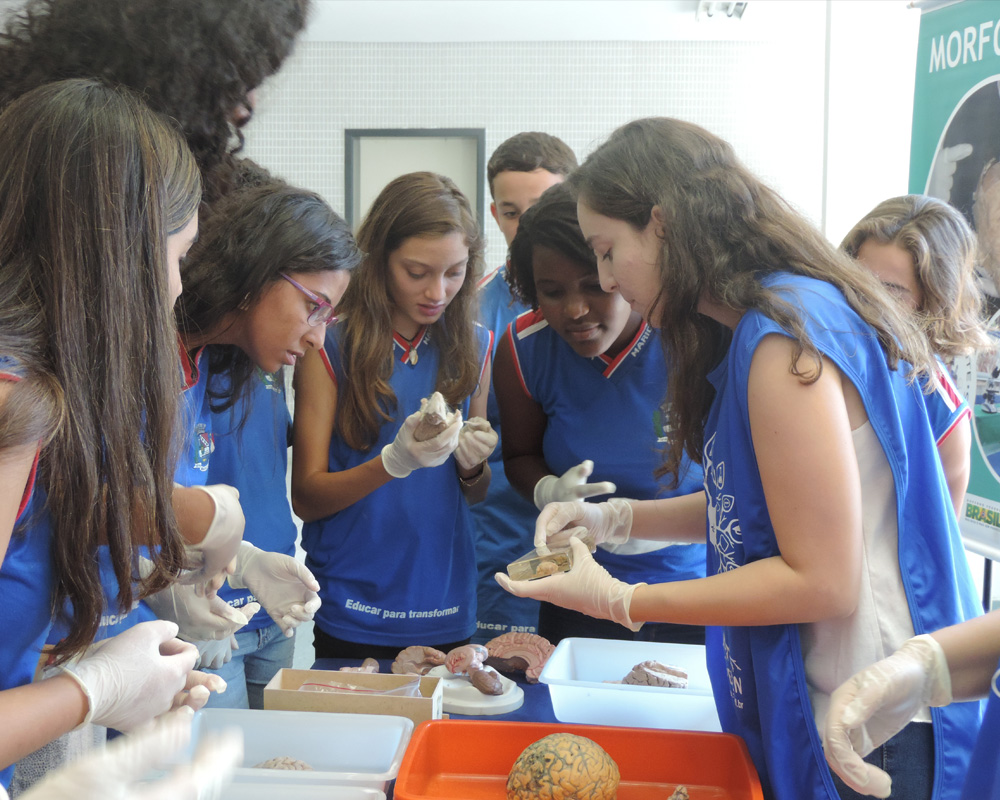Brain Awareness Week
Exciting Activities for Kids


Event Ideas
Brain Awareness Week is a great time to get kids excited about brain science! Here are just a few activity suggestions for younger audiences.
General Ideas:
- Set up and staff an exhibit table at your school, community center, library, or shopping mall with the Dana Foundation’s free handouts. Print and share our fact sheets and puzzles.
- Ask your school or local library to organize a BAW display with books and reference material about the brain or offer to set up your own display.
- Organize a brain fair with hands-on activities, games, and experiments. Invite local colleges/universities and disease advocacy groups to participate.
- Organize a brain art, essay, poetry, music, or drama competition on a brain-related theme for local schoolchildren.
- Host a Brain Trivia Contest. Use our Truth or Myth Flash Cards, facts sheets, and Glossary as sources for your questions!
- Organize a film festival featuring movies about the brain. Some popular films include Finding Dory, Inside Out, and Awakenings. Follow each film with a discussion.
Ideas for Teachers:
- Present one of the Dana Foundation’s lesson plans. Topics include neuroanatomy, brain injury/prevention, memory, optical illusions, and depression. Each lesson includes an engaging classroom activity!
- Present a unit from the Franklin Institute’s Neuroscience & Society Curriculum. The curriculum offers an in-depth focus on neuroscience through the lens of relevant societal issues, designed to be appropriate for grades 10-12. Topics include education and development, mental health and wellbeing, substance use and addiction, law and criminology, and future technologies.
- Use one of the Dana Foundation’s puzzle packetsas a classroom activity. The puzzles are free and available for download.
- Incorporate daily brain facts or brain fitness tips in your school announcements during BAW. Use the Dana Foundation’s fact sheets and Glossary as a resource.
- Assign students a project about the brain, such as creating poster presentations, bulletin board displays, or videos. Have students present their projects to their classmates or to younger students in your school.
- Watch an episode of the University of Washington’s BrainWorks video series with students and teachers, and use the viewer guides for a class discussion.
- Use the Society for Neuroscience’s Find a Neuroscientist search engine to locate a scientist in your area to speak to your class or school about the brain.
Ideas for Scientists:
- Visit local schools to present lectures, hands-on activities, demonstrations, and experiments about the brain to students.
- Contact after-school programs in your community (Boys & Girls Clubs, Girl/Boy Scouts, etc.) and volunteer to give a presentation about the brain to participating children.
- Hold lab tours for local students to excite them about the research being done in their community and inspire them to pursue careers in neuroscience.
- Host an “Ask Me Anything” Q&A session, allowing students to ask questions about your research, career path, and neuroscience topics of interest and concern to them.
- Engage middle and/or high school students in reflection and conversation about future neurotechnologies using free, hands-on activities from the NISE Network’s Changing Brains project. Activities include:
- What Makes Us Human: Participants explore what it means to be human and how humanlike machines may become.
- Neuro Futures Card Game: Participants prioritize cards with new technologies according to your own values and the values of others.
- Neuro Futures Championship Game: Participants pit new neurotechnologies head-to-head using a sports-style bracket.
- Contact local schools to determine if there will be any science fairs during March. Volunteer your institution as a resource for students wishing to do science fair projects on the brain.
- Create traveling displays or interactive exhibits on the brain and present them at local schools, community centers, libraries, shopping malls, and other public spaces.
- Get involved in the International Brain Bee, a live Q&A competition that tests the neuroscience knowledge of high school students. For more information, visit the official International Brain Bee
- Partner with a science museum to present exhibits, demonstrations, hands-on activities, and experiments about brain structure, function, and diseases and disorders. Science museums often have extensive contacts at local schools and can help draw this audience to your events.